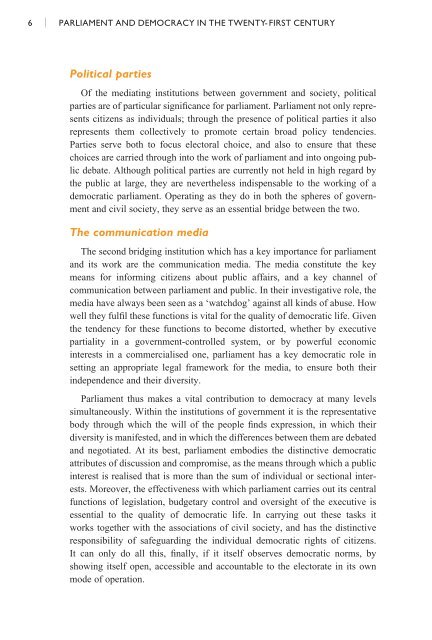PARLIAMENT AND DEMOCRACY - Inter-Parliamentary Union
PARLIAMENT AND DEMOCRACY - Inter-Parliamentary Union
PARLIAMENT AND DEMOCRACY - Inter-Parliamentary Union
Create successful ePaper yourself
Turn your PDF publications into a flip-book with our unique Google optimized e-Paper software.
6 I <strong>PARLIAMENT</strong> <strong>AND</strong> <strong>DEMOCRACY</strong> IN THE TWENTY-FIRST CENTURY<br />
Political parties<br />
Of the mediating institutions between government and society, political<br />
parties are of particular significance for parliament. Parliament not only represents<br />
citizens as individuals; through the presence of political parties it also<br />
represents them collectively to promote certain broad policy tendencies.<br />
Parties serve both to focus electoral choice, and also to ensure that these<br />
choices are carried through into the work of parliament and into ongoing public<br />
debate. Although political parties are currently not held in high regard by<br />
the public at large, they are nevertheless indispensable to the working of a<br />
democratic parliament. Operating as they do in both the spheres of government<br />
and civil society, they serve as an essential bridge between the two.<br />
The communication media<br />
The second bridging institution which has a key importance for parliament<br />
and its work are the communication media. The media constitute the key<br />
means for informing citizens about public affairs, and a key channel of<br />
communication between parliament and public. In their investigative role, the<br />
media have always been seen as a ‘watchdog’ against all kinds of abuse. How<br />
well they fulfil these functions is vital for the quality of democratic life. Given<br />
the tendency for these functions to become distorted, whether by executive<br />
partiality in a government-controlled system, or by powerful economic<br />
interests in a commercialised one, parliament has a key democratic role in<br />
setting an appropriate legal framework for the media, to ensure both their<br />
independence and their diversity.<br />
Parliament thus makes a vital contribution to democracy at many levels<br />
simultaneously. Within the institutions of government it is the representative<br />
body through which the will of the people finds expression, in which their<br />
diversity is manifested, and in which the differences between them are debated<br />
and negotiated. At its best, parliament embodies the distinctive democratic<br />
attributes of discussion and compromise, as the means through which a public<br />
interest is realised that is more than the sum of individual or sectional interests.<br />
Moreover, the effectiveness with which parliament carries out its central<br />
functions of legislation, budgetary control and oversight of the executive is<br />
essential to the quality of democratic life. In carrying out these tasks it<br />
works together with the associations of civil society, and has the distinctive<br />
responsibility of safeguarding the individual democratic rights of citizens.<br />
It can only do all this, finally, if it itself observes democratic norms, by<br />
showing itself open, accessible and accountable to the electorate in its own<br />
mode of operation.

















